UNCC300 - Workplace Discrimination in Nursing Practice & Common Good
VerifiedAdded on 2023/06/11
|6
|1757
|243
Essay
AI Summary
This essay addresses the pervasive issue of workplace discrimination in nursing, highlighting its detrimental effects on nurses' performance, psychological well-being, and ultimately, patient care. It examines how discrimination violates the principle of the common good, as defined by Catholic Social Teaching, and explores various factors contributing to this problem, including hierarchical healthcare structures, gender stereotypes, and inadequate communication. The essay proposes several solutions, such as fostering community building, implementing culturally competent practices, and promoting awareness of Catholic Social Teaching principles to ensure the dignity of work and the rights of workers. By addressing discrimination and promoting equality, healthcare organizations can improve job satisfaction, reduce turnover, and enhance the quality of patient care. Desklib offers a platform to access this essay and many other resources for students.
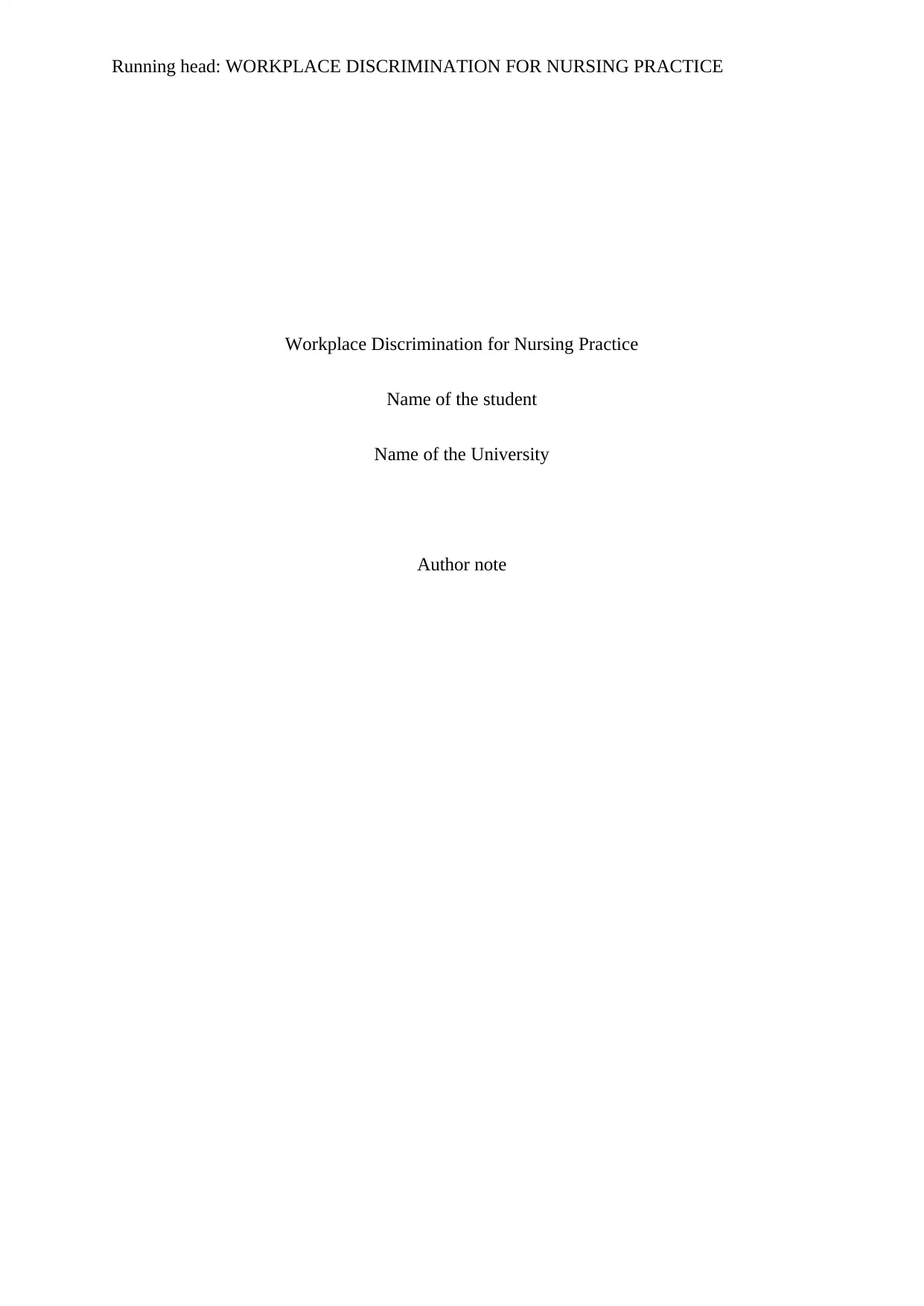
Running head: WORKPLACE DISCRIMINATION FOR NURSING PRACTICE
Workplace Discrimination for Nursing Practice
Name of the student
Name of the University
Author note
Workplace Discrimination for Nursing Practice
Name of the student
Name of the University
Author note
Paraphrase This Document
Need a fresh take? Get an instant paraphrase of this document with our AI Paraphraser
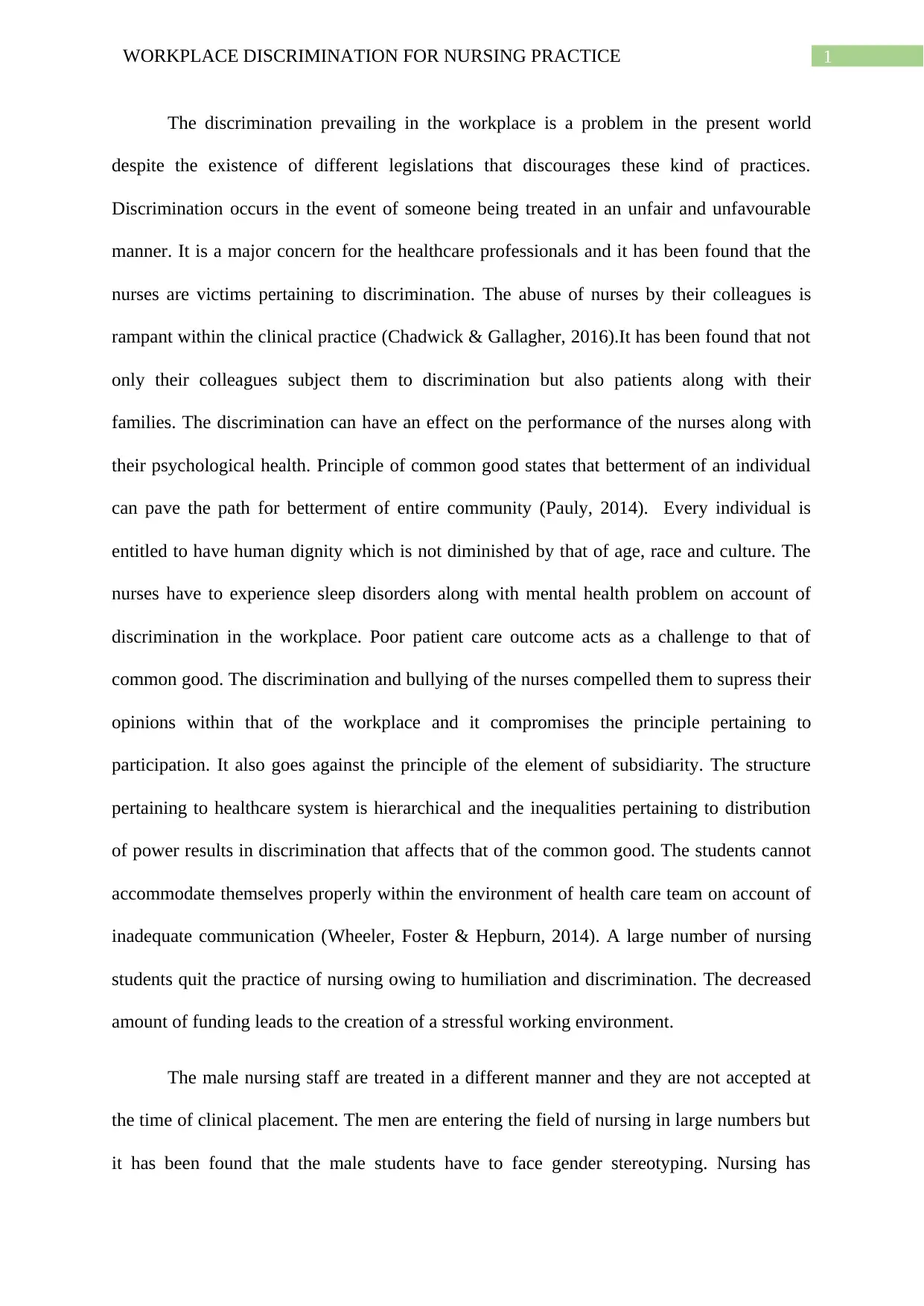
1WORKPLACE DISCRIMINATION FOR NURSING PRACTICE
The discrimination prevailing in the workplace is a problem in the present world
despite the existence of different legislations that discourages these kind of practices.
Discrimination occurs in the event of someone being treated in an unfair and unfavourable
manner. It is a major concern for the healthcare professionals and it has been found that the
nurses are victims pertaining to discrimination. The abuse of nurses by their colleagues is
rampant within the clinical practice (Chadwick & Gallagher, 2016).It has been found that not
only their colleagues subject them to discrimination but also patients along with their
families. The discrimination can have an effect on the performance of the nurses along with
their psychological health. Principle of common good states that betterment of an individual
can pave the path for betterment of entire community (Pauly, 2014). Every individual is
entitled to have human dignity which is not diminished by that of age, race and culture. The
nurses have to experience sleep disorders along with mental health problem on account of
discrimination in the workplace. Poor patient care outcome acts as a challenge to that of
common good. The discrimination and bullying of the nurses compelled them to supress their
opinions within that of the workplace and it compromises the principle pertaining to
participation. It also goes against the principle of the element of subsidiarity. The structure
pertaining to healthcare system is hierarchical and the inequalities pertaining to distribution
of power results in discrimination that affects that of the common good. The students cannot
accommodate themselves properly within the environment of health care team on account of
inadequate communication (Wheeler, Foster & Hepburn, 2014). A large number of nursing
students quit the practice of nursing owing to humiliation and discrimination. The decreased
amount of funding leads to the creation of a stressful working environment.
The male nursing staff are treated in a different manner and they are not accepted at
the time of clinical placement. The men are entering the field of nursing in large numbers but
it has been found that the male students have to face gender stereotyping. Nursing has
The discrimination prevailing in the workplace is a problem in the present world
despite the existence of different legislations that discourages these kind of practices.
Discrimination occurs in the event of someone being treated in an unfair and unfavourable
manner. It is a major concern for the healthcare professionals and it has been found that the
nurses are victims pertaining to discrimination. The abuse of nurses by their colleagues is
rampant within the clinical practice (Chadwick & Gallagher, 2016).It has been found that not
only their colleagues subject them to discrimination but also patients along with their
families. The discrimination can have an effect on the performance of the nurses along with
their psychological health. Principle of common good states that betterment of an individual
can pave the path for betterment of entire community (Pauly, 2014). Every individual is
entitled to have human dignity which is not diminished by that of age, race and culture. The
nurses have to experience sleep disorders along with mental health problem on account of
discrimination in the workplace. Poor patient care outcome acts as a challenge to that of
common good. The discrimination and bullying of the nurses compelled them to supress their
opinions within that of the workplace and it compromises the principle pertaining to
participation. It also goes against the principle of the element of subsidiarity. The structure
pertaining to healthcare system is hierarchical and the inequalities pertaining to distribution
of power results in discrimination that affects that of the common good. The students cannot
accommodate themselves properly within the environment of health care team on account of
inadequate communication (Wheeler, Foster & Hepburn, 2014). A large number of nursing
students quit the practice of nursing owing to humiliation and discrimination. The decreased
amount of funding leads to the creation of a stressful working environment.
The male nursing staff are treated in a different manner and they are not accepted at
the time of clinical placement. The men are entering the field of nursing in large numbers but
it has been found that the male students have to face gender stereotyping. Nursing has
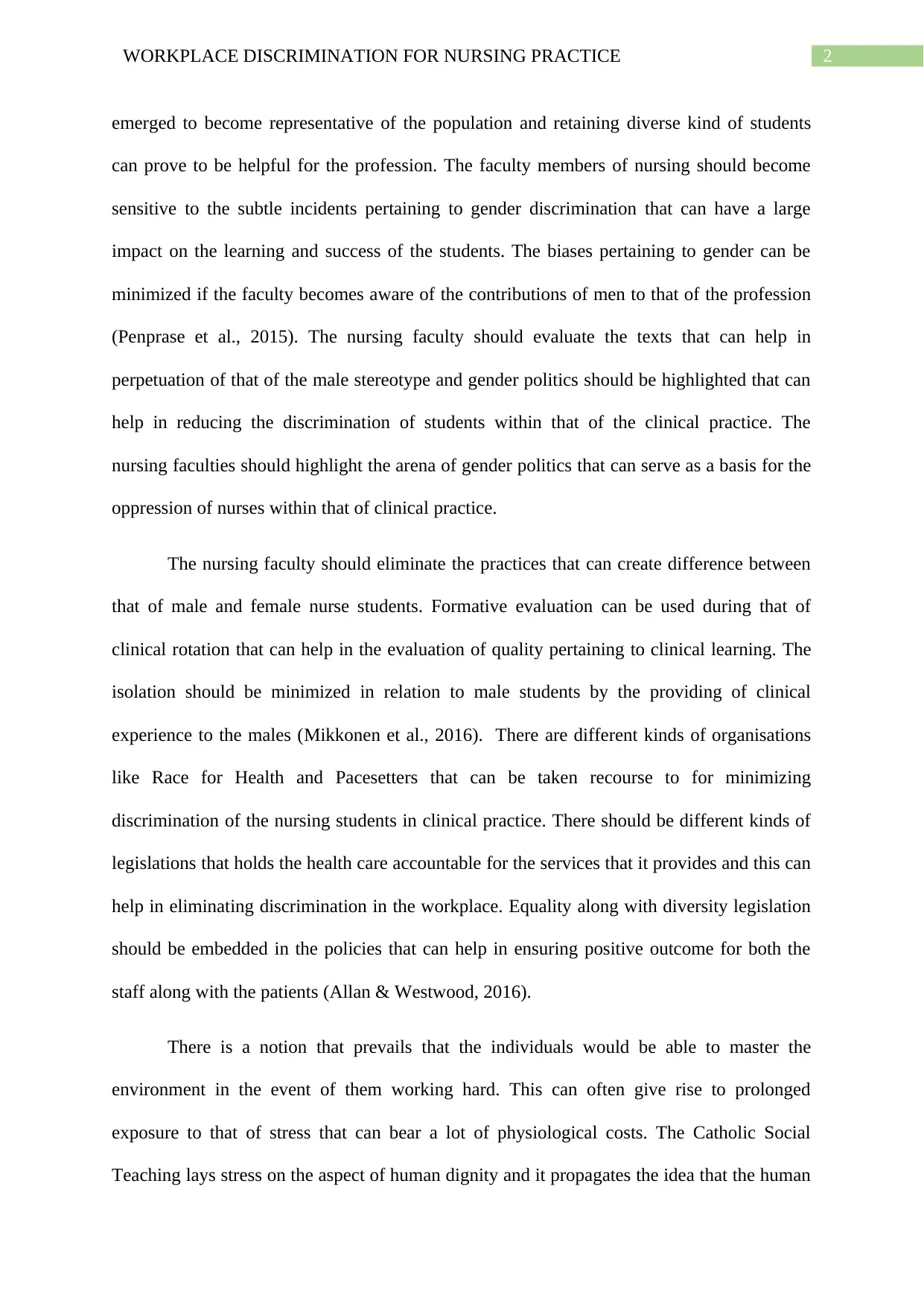
2WORKPLACE DISCRIMINATION FOR NURSING PRACTICE
emerged to become representative of the population and retaining diverse kind of students
can prove to be helpful for the profession. The faculty members of nursing should become
sensitive to the subtle incidents pertaining to gender discrimination that can have a large
impact on the learning and success of the students. The biases pertaining to gender can be
minimized if the faculty becomes aware of the contributions of men to that of the profession
(Penprase et al., 2015). The nursing faculty should evaluate the texts that can help in
perpetuation of that of the male stereotype and gender politics should be highlighted that can
help in reducing the discrimination of students within that of the clinical practice. The
nursing faculties should highlight the arena of gender politics that can serve as a basis for the
oppression of nurses within that of clinical practice.
The nursing faculty should eliminate the practices that can create difference between
that of male and female nurse students. Formative evaluation can be used during that of
clinical rotation that can help in the evaluation of quality pertaining to clinical learning. The
isolation should be minimized in relation to male students by the providing of clinical
experience to the males (Mikkonen et al., 2016). There are different kinds of organisations
like Race for Health and Pacesetters that can be taken recourse to for minimizing
discrimination of the nursing students in clinical practice. There should be different kinds of
legislations that holds the health care accountable for the services that it provides and this can
help in eliminating discrimination in the workplace. Equality along with diversity legislation
should be embedded in the policies that can help in ensuring positive outcome for both the
staff along with the patients (Allan & Westwood, 2016).
There is a notion that prevails that the individuals would be able to master the
environment in the event of them working hard. This can often give rise to prolonged
exposure to that of stress that can bear a lot of physiological costs. The Catholic Social
Teaching lays stress on the aspect of human dignity and it propagates the idea that the human
emerged to become representative of the population and retaining diverse kind of students
can prove to be helpful for the profession. The faculty members of nursing should become
sensitive to the subtle incidents pertaining to gender discrimination that can have a large
impact on the learning and success of the students. The biases pertaining to gender can be
minimized if the faculty becomes aware of the contributions of men to that of the profession
(Penprase et al., 2015). The nursing faculty should evaluate the texts that can help in
perpetuation of that of the male stereotype and gender politics should be highlighted that can
help in reducing the discrimination of students within that of the clinical practice. The
nursing faculties should highlight the arena of gender politics that can serve as a basis for the
oppression of nurses within that of clinical practice.
The nursing faculty should eliminate the practices that can create difference between
that of male and female nurse students. Formative evaluation can be used during that of
clinical rotation that can help in the evaluation of quality pertaining to clinical learning. The
isolation should be minimized in relation to male students by the providing of clinical
experience to the males (Mikkonen et al., 2016). There are different kinds of organisations
like Race for Health and Pacesetters that can be taken recourse to for minimizing
discrimination of the nursing students in clinical practice. There should be different kinds of
legislations that holds the health care accountable for the services that it provides and this can
help in eliminating discrimination in the workplace. Equality along with diversity legislation
should be embedded in the policies that can help in ensuring positive outcome for both the
staff along with the patients (Allan & Westwood, 2016).
There is a notion that prevails that the individuals would be able to master the
environment in the event of them working hard. This can often give rise to prolonged
exposure to that of stress that can bear a lot of physiological costs. The Catholic Social
Teaching lays stress on the aspect of human dignity and it propagates the idea that the human
⊘ This is a preview!⊘
Do you want full access?
Subscribe today to unlock all pages.

Trusted by 1+ million students worldwide
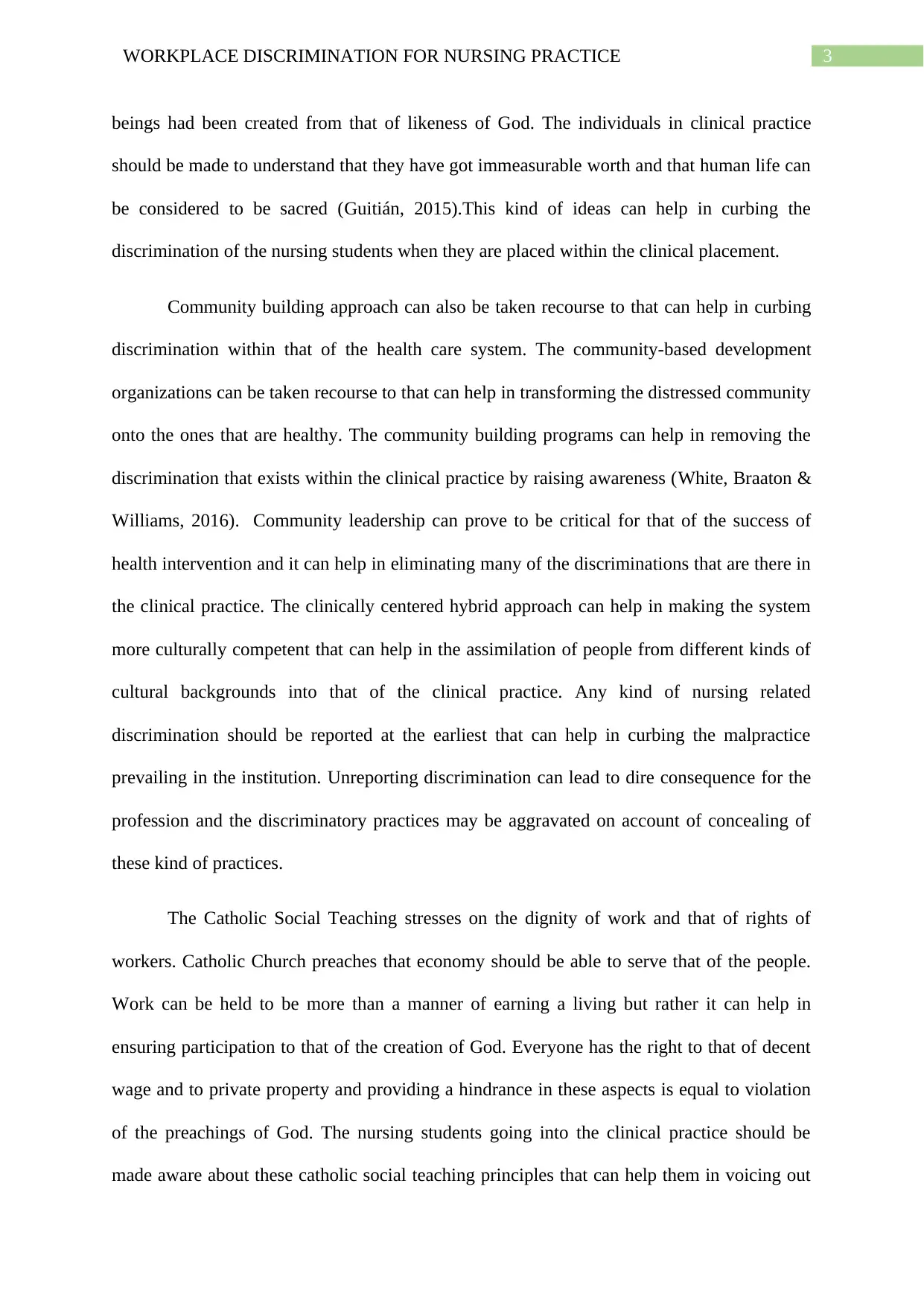
3WORKPLACE DISCRIMINATION FOR NURSING PRACTICE
beings had been created from that of likeness of God. The individuals in clinical practice
should be made to understand that they have got immeasurable worth and that human life can
be considered to be sacred (Guitián, 2015).This kind of ideas can help in curbing the
discrimination of the nursing students when they are placed within the clinical placement.
Community building approach can also be taken recourse to that can help in curbing
discrimination within that of the health care system. The community-based development
organizations can be taken recourse to that can help in transforming the distressed community
onto the ones that are healthy. The community building programs can help in removing the
discrimination that exists within the clinical practice by raising awareness (White, Braaton &
Williams, 2016). Community leadership can prove to be critical for that of the success of
health intervention and it can help in eliminating many of the discriminations that are there in
the clinical practice. The clinically centered hybrid approach can help in making the system
more culturally competent that can help in the assimilation of people from different kinds of
cultural backgrounds into that of the clinical practice. Any kind of nursing related
discrimination should be reported at the earliest that can help in curbing the malpractice
prevailing in the institution. Unreporting discrimination can lead to dire consequence for the
profession and the discriminatory practices may be aggravated on account of concealing of
these kind of practices.
The Catholic Social Teaching stresses on the dignity of work and that of rights of
workers. Catholic Church preaches that economy should be able to serve that of the people.
Work can be held to be more than a manner of earning a living but rather it can help in
ensuring participation to that of the creation of God. Everyone has the right to that of decent
wage and to private property and providing a hindrance in these aspects is equal to violation
of the preachings of God. The nursing students going into the clinical practice should be
made aware about these catholic social teaching principles that can help them in voicing out
beings had been created from that of likeness of God. The individuals in clinical practice
should be made to understand that they have got immeasurable worth and that human life can
be considered to be sacred (Guitián, 2015).This kind of ideas can help in curbing the
discrimination of the nursing students when they are placed within the clinical placement.
Community building approach can also be taken recourse to that can help in curbing
discrimination within that of the health care system. The community-based development
organizations can be taken recourse to that can help in transforming the distressed community
onto the ones that are healthy. The community building programs can help in removing the
discrimination that exists within the clinical practice by raising awareness (White, Braaton &
Williams, 2016). Community leadership can prove to be critical for that of the success of
health intervention and it can help in eliminating many of the discriminations that are there in
the clinical practice. The clinically centered hybrid approach can help in making the system
more culturally competent that can help in the assimilation of people from different kinds of
cultural backgrounds into that of the clinical practice. Any kind of nursing related
discrimination should be reported at the earliest that can help in curbing the malpractice
prevailing in the institution. Unreporting discrimination can lead to dire consequence for the
profession and the discriminatory practices may be aggravated on account of concealing of
these kind of practices.
The Catholic Social Teaching stresses on the dignity of work and that of rights of
workers. Catholic Church preaches that economy should be able to serve that of the people.
Work can be held to be more than a manner of earning a living but rather it can help in
ensuring participation to that of the creation of God. Everyone has the right to that of decent
wage and to private property and providing a hindrance in these aspects is equal to violation
of the preachings of God. The nursing students going into the clinical practice should be
made aware about these catholic social teaching principles that can help them in voicing out
Paraphrase This Document
Need a fresh take? Get an instant paraphrase of this document with our AI Paraphraser
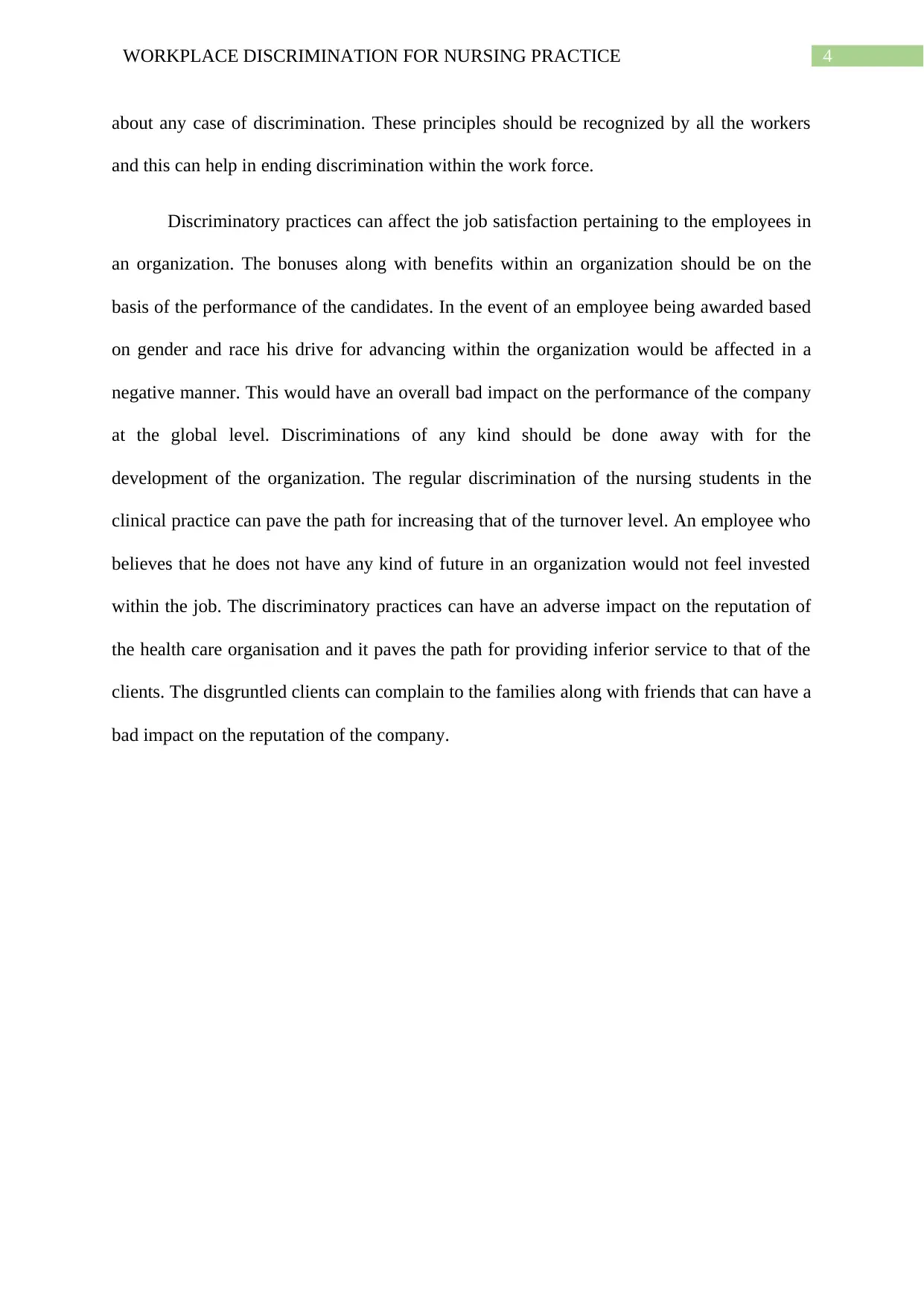
4WORKPLACE DISCRIMINATION FOR NURSING PRACTICE
about any case of discrimination. These principles should be recognized by all the workers
and this can help in ending discrimination within the work force.
Discriminatory practices can affect the job satisfaction pertaining to the employees in
an organization. The bonuses along with benefits within an organization should be on the
basis of the performance of the candidates. In the event of an employee being awarded based
on gender and race his drive for advancing within the organization would be affected in a
negative manner. This would have an overall bad impact on the performance of the company
at the global level. Discriminations of any kind should be done away with for the
development of the organization. The regular discrimination of the nursing students in the
clinical practice can pave the path for increasing that of the turnover level. An employee who
believes that he does not have any kind of future in an organization would not feel invested
within the job. The discriminatory practices can have an adverse impact on the reputation of
the health care organisation and it paves the path for providing inferior service to that of the
clients. The disgruntled clients can complain to the families along with friends that can have a
bad impact on the reputation of the company.
about any case of discrimination. These principles should be recognized by all the workers
and this can help in ending discrimination within the work force.
Discriminatory practices can affect the job satisfaction pertaining to the employees in
an organization. The bonuses along with benefits within an organization should be on the
basis of the performance of the candidates. In the event of an employee being awarded based
on gender and race his drive for advancing within the organization would be affected in a
negative manner. This would have an overall bad impact on the performance of the company
at the global level. Discriminations of any kind should be done away with for the
development of the organization. The regular discrimination of the nursing students in the
clinical practice can pave the path for increasing that of the turnover level. An employee who
believes that he does not have any kind of future in an organization would not feel invested
within the job. The discriminatory practices can have an adverse impact on the reputation of
the health care organisation and it paves the path for providing inferior service to that of the
clients. The disgruntled clients can complain to the families along with friends that can have a
bad impact on the reputation of the company.
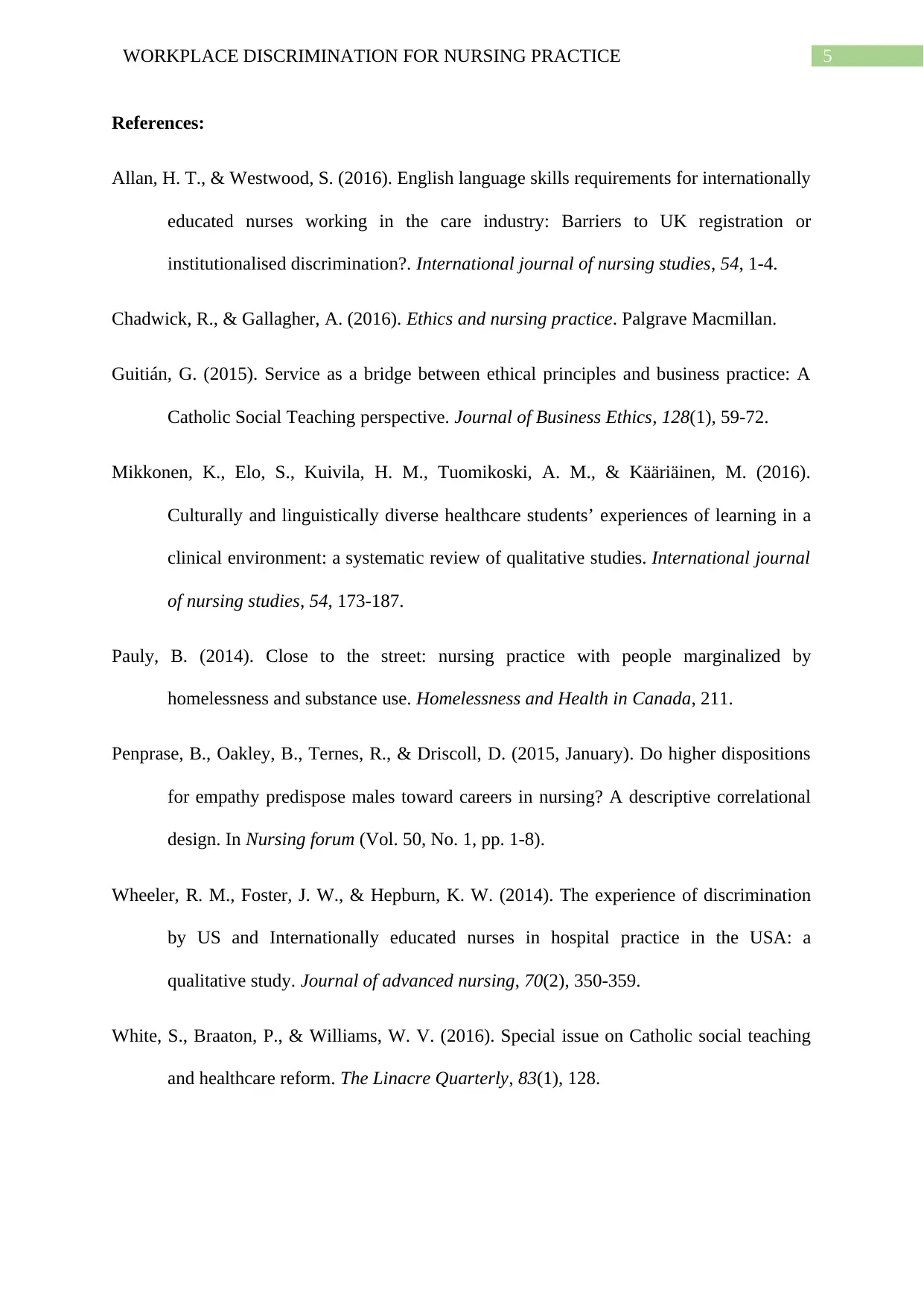
5WORKPLACE DISCRIMINATION FOR NURSING PRACTICE
References:
Allan, H. T., & Westwood, S. (2016). English language skills requirements for internationally
educated nurses working in the care industry: Barriers to UK registration or
institutionalised discrimination?. International journal of nursing studies, 54, 1-4.
Chadwick, R., & Gallagher, A. (2016). Ethics and nursing practice. Palgrave Macmillan.
Guitián, G. (2015). Service as a bridge between ethical principles and business practice: A
Catholic Social Teaching perspective. Journal of Business Ethics, 128(1), 59-72.
Mikkonen, K., Elo, S., Kuivila, H. M., Tuomikoski, A. M., & Kääriäinen, M. (2016).
Culturally and linguistically diverse healthcare students’ experiences of learning in a
clinical environment: a systematic review of qualitative studies. International journal
of nursing studies, 54, 173-187.
Pauly, B. (2014). Close to the street: nursing practice with people marginalized by
homelessness and substance use. Homelessness and Health in Canada, 211.
Penprase, B., Oakley, B., Ternes, R., & Driscoll, D. (2015, January). Do higher dispositions
for empathy predispose males toward careers in nursing? A descriptive correlational
design. In Nursing forum (Vol. 50, No. 1, pp. 1-8).
Wheeler, R. M., Foster, J. W., & Hepburn, K. W. (2014). The experience of discrimination
by US and Internationally educated nurses in hospital practice in the USA: a
qualitative study. Journal of advanced nursing, 70(2), 350-359.
White, S., Braaton, P., & Williams, W. V. (2016). Special issue on Catholic social teaching
and healthcare reform. The Linacre Quarterly, 83(1), 128.
References:
Allan, H. T., & Westwood, S. (2016). English language skills requirements for internationally
educated nurses working in the care industry: Barriers to UK registration or
institutionalised discrimination?. International journal of nursing studies, 54, 1-4.
Chadwick, R., & Gallagher, A. (2016). Ethics and nursing practice. Palgrave Macmillan.
Guitián, G. (2015). Service as a bridge between ethical principles and business practice: A
Catholic Social Teaching perspective. Journal of Business Ethics, 128(1), 59-72.
Mikkonen, K., Elo, S., Kuivila, H. M., Tuomikoski, A. M., & Kääriäinen, M. (2016).
Culturally and linguistically diverse healthcare students’ experiences of learning in a
clinical environment: a systematic review of qualitative studies. International journal
of nursing studies, 54, 173-187.
Pauly, B. (2014). Close to the street: nursing practice with people marginalized by
homelessness and substance use. Homelessness and Health in Canada, 211.
Penprase, B., Oakley, B., Ternes, R., & Driscoll, D. (2015, January). Do higher dispositions
for empathy predispose males toward careers in nursing? A descriptive correlational
design. In Nursing forum (Vol. 50, No. 1, pp. 1-8).
Wheeler, R. M., Foster, J. W., & Hepburn, K. W. (2014). The experience of discrimination
by US and Internationally educated nurses in hospital practice in the USA: a
qualitative study. Journal of advanced nursing, 70(2), 350-359.
White, S., Braaton, P., & Williams, W. V. (2016). Special issue on Catholic social teaching
and healthcare reform. The Linacre Quarterly, 83(1), 128.
⊘ This is a preview!⊘
Do you want full access?
Subscribe today to unlock all pages.

Trusted by 1+ million students worldwide
1 out of 6
Related Documents
Your All-in-One AI-Powered Toolkit for Academic Success.
+13062052269
info@desklib.com
Available 24*7 on WhatsApp / Email
![[object Object]](/_next/static/media/star-bottom.7253800d.svg)
Unlock your academic potential
Copyright © 2020–2026 A2Z Services. All Rights Reserved. Developed and managed by ZUCOL.





